
Marijuana and cancer—it’s a subject with growing interest around the country. Cancer is a topic with high emotional resistance, and rightfully so. Just in the United States, an estimated 1,762,450 cancers will be in diagnosed in 2019, which equates to more than 4,800 new cases each day.
Cancer is the hallmark disease of modern society. There are few individuals that haven’t been touched by this complex family of diseases, from diagnosed friends and family to those who’ve battled cancer themselves. Those diagnosed are faced with few options when it comes to treatment and pain management: chemotherapy and radiation dominate, leading many to wonder if there are more natural methods to fighting back.
In an era where the collective mood is changing towards cannabis, more individuals are curious about using marijuana for treatment and pain management. This guide offers information about marijuana and cannabis complete with patient resources to help you and your family through one of the most difficult times.
Table of Contents
The cannabis plant has been used in nearly every culture for centuries. In fact, cannabis is included in the 50 fundamental herbs within the cornucopia of Traditional Chinese Medicine. It has been used as a medicine for nearly 3,000 years and cited in ancient texts as having healing properties in over 100 ailments. Yet cannabis was removed from the U.S. Pharmacopeia in 1942 and continues to be classified as a Schedule I drug — high potential for abuse and no known medical use.
However, oncologists — more than doctors in any other discipline — support the option of recommending cannabis as part of a treatment program for patients suffering from cancer. In a 2014 Medscape survey of roughly 1,500 doctors, researchers found that 56 percent supported legalizing medical cannabis at a federal level, with oncologists making up 82 percent of those in favor of cannabis.
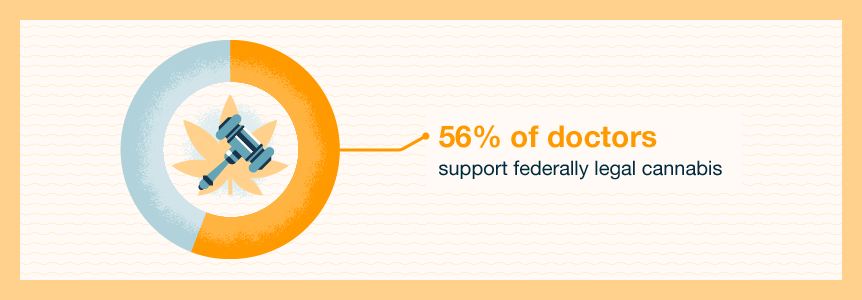
***We don’t recommend or endorse therapies or practitioners from the resource list above. We’re not promoting anything except informed choice — something we believe every person with cancer should have.
With the growing interest in cannabis for cancer, many people wonder if marijuana cures cancer. While much research is needed to answer this question, cannabis has been proven to be incredibly beneficial for the body. This section addresses how cannabis works in the body to provide healing properties.
There are hundreds of chemical compounds in the cannabis plant that work together to provide relief from an array of symptoms. These compounds work by imitating those that our bodies produce naturally — they are called endocannabinoids. The endocannabinoid system (ECS) was discovered in the early 1990s and is responsible for regulating a wide array of bodily functions. Things like mood and immune function — as well as a variety of physiological and pathological conditions such as inflammation, analgesia and cancer — are regulated by the ECS.
When you consume cannabis, cannabinoids bind to endocannabinoid receptors in the central nervous system: in the brain (CB1 receptors), body (CB2 receptors) and cells of the immune system. Different cannabinoids can have different pain-relieving effects and health benefits depending on which receptors they bind to. Of the 85 cannabinoids found in the marijuana plant, the most commonly studied components are the chemicals delta-9-tetrahydrocannabinol (THC) and cannabidiol (CBD), which hold a variety of healing properties. These cannabinoids are thought to have cancer-fighting benefits, such as:
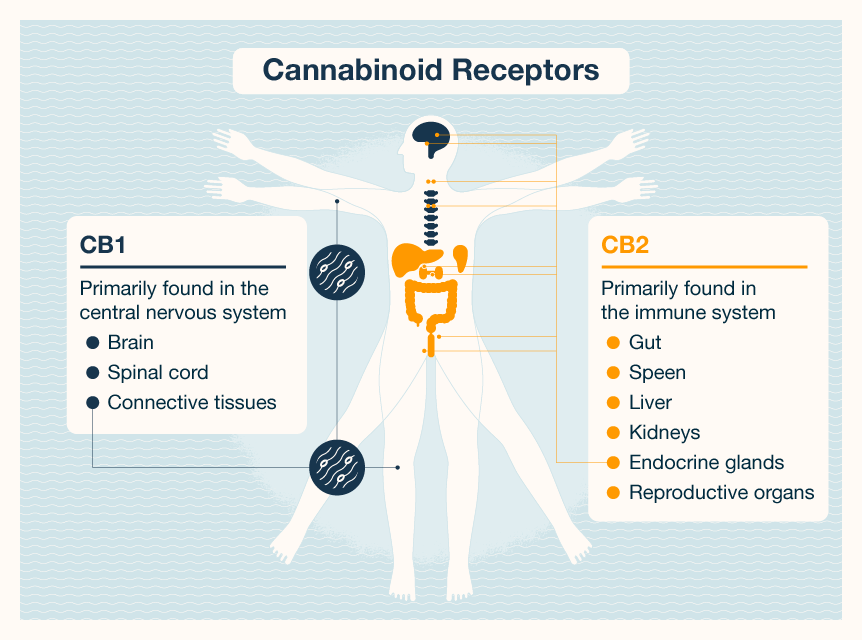
Cannabinoids found in cannabis plants hold many beneficial properties for the human body, which is why medical cannabis is commonly used in cancer patients to treat and manage painful symptoms of conventional treatments like chemotherapy and radiation.
Medical marijuana is approved in many states as a supplemental treatment for cancer patients. That’s because cannabis is proven to relieve many uncomfortable and painful symptoms caused by cancer and its conventional treatments.
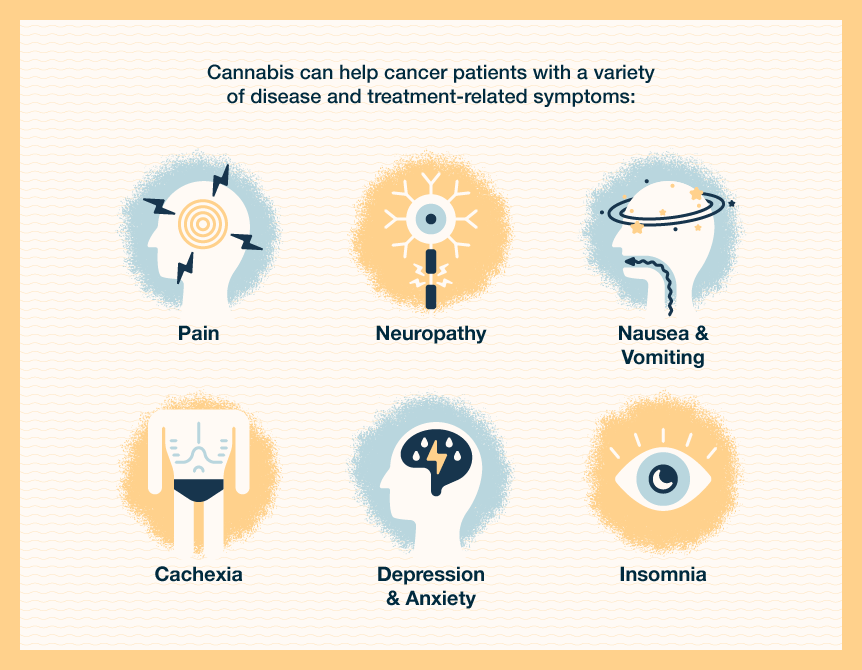
While marijuana is also thought to possess cancer-fighting abilities, clinical studies are limited because marijuana is still classified as an illegal substance by the federal government. Consequently, the federal government’s position on cannabis stifles much-needed research on cannabis as a “cure” for cancer.
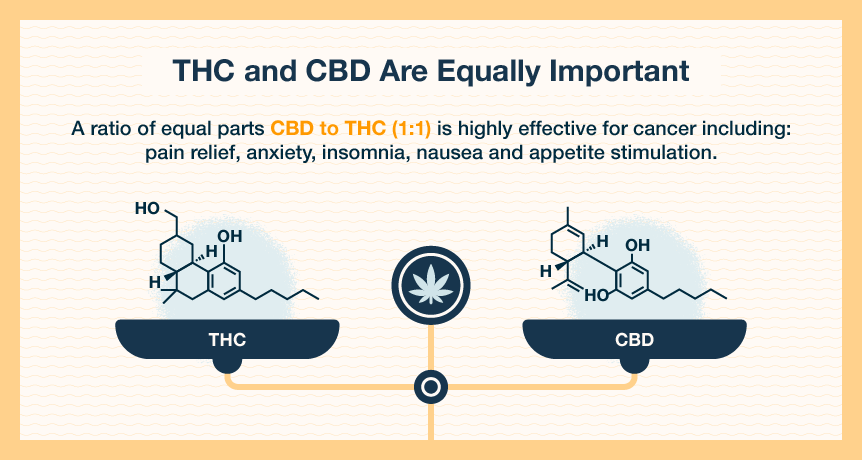
A CBD:THC ratio refers to the amount of both cannabinoid compounds present in any form of cannabis, such as flower, edibles or extracts. THC and CBD hold unique healing properties, but reach their full potential when combined together and with other compounds in the cannabis plant — also known as the “entourage effect.” The optimal ratio will vary depending on one’s individual physiology, medical conditions and cannabis tolerance.
A ratio of equal parts CBD to THC (1:1) is considered highly effective for pain relief, anxiety, insomnia, nausea and appetite stimulation. An equal ratio may also be able to kill certain cancer cells and inhibit tumor growth. This is a good starting point for patients due to the multitude of conditions it may treat with minimal impairment. Some research has found that if you apply THC and CBD to cancer cells in the lab, the combination is more effective than applying THC alone. When used together, these cannabinoids are believed to exert a synergistic effect on reducing and inhibiting tumor growth.
Whole plant medicine is extremely important when it comes to using cannabis for cancer treatment and pain management. The success of medical cannabis for relieving pain in cancer patients largely depends on the entourage effect.
Search the internet for “cannabis and cancer” and you’ll find millions of web pages, making it difficult to sort through the information most applicable and valuable to your circumstance. To help you-you analyze, find clarity and seek out true educational information, we’ve put together this list of resources for cancer patients who are considering cannabis as a form of treatment. Explore this collection of websites and pages for further guidance.
While we’ve included a number of studies, books and organizational resources, those below are geared specifically towards cancer patients and their families.
Patient-Specific Resources
United Patients Group
The United Patients Group is a trusted leader in medical cannabis for physicians, patients and organizations. UPG offers an excellent compendium of data for patients and professionals alike, acting as a virtual hand for patients by helping them navigate the cannabis industry.
Patients Out of Time
Patients Out of Time has been at work for more than 20 years and is considered the “granddaddy” of medical cannabis advocacy groups. This non-profit group includes information from members of professional health care organizations who have taken the lead in urging their organizations to formally support patient access to medical cannabis. They offer a robust library of cancer-specific resources and studies.
Illegally Healed
Illegally Healed is a go-to site for patient testimonials and videos. They aim to produce engaging content related to cannabis science and medical cannabis news. Illegally Healed also offers a wealth of cancer-specific resources to educate their community about the full healing capabilities of cannabis.
Medical Jane
Medical Jane works to create patient-focused resources that offer trustworthy education, helpful guides and access to industry professionals. They also list a wealth of disease-specific information including research for several different forms of cancer.
Cannabis Patients Alliance
The Cannabis Patients Alliance is a Colorado-based patients group with many personal stories and resource materials. They’re widely known for participating in policy-making and cannabis advocacy and serve as a source for the press when issues arise that deal specifically with medical marijuana patients.
Beyond Conventional Cancer Therapies
Beyond Conventional Cancer Therapies is an organization that helps patients explore the best integrative approaches to cancer diagnosis and treatments that go beyond conventional cancer care. They review a wide range of integrative and complementary therapies, including cannabis for cancer by reporting known benefits, risks, side effects and other information to help patients make an informed choice.
Marijuana Doctors: Treatable Conditions
This page offers a comprehensive list of ailments. Search by ailment to find symptoms and/or side effects that can be treated or managed with medical marijuana.
States Where Marijuana is Legal
Cannabis is an ever-changing industry, so it’s important to stay up-to-date on the most recent laws and changes in legislation. This page is an excellent resource for which states have legal marijuana: both recreational and medical.
In addition to the patient-specific resources above, this list includes organizations that may be useful to professionals, cancer patients and their families. This includes helpful resources for finding more information about cannabis research, clinicians and access.
Helpful Support Organizations
Educational Reports, Books and Podcasts
***We don’t recommend or endorse therapies or practitioners from the resource list above. We’re not promoting anything except informed choice — something we believe every person with cancer should have.
Cannabis is an ever-changing industry that can be difficult for cancer patients and their family to navigate — the legality of cannabis being one of the most common concerns. This map provides a visual guide of the states where marijuana is considered both recreationally and medically legal, only medically legal and illegal.
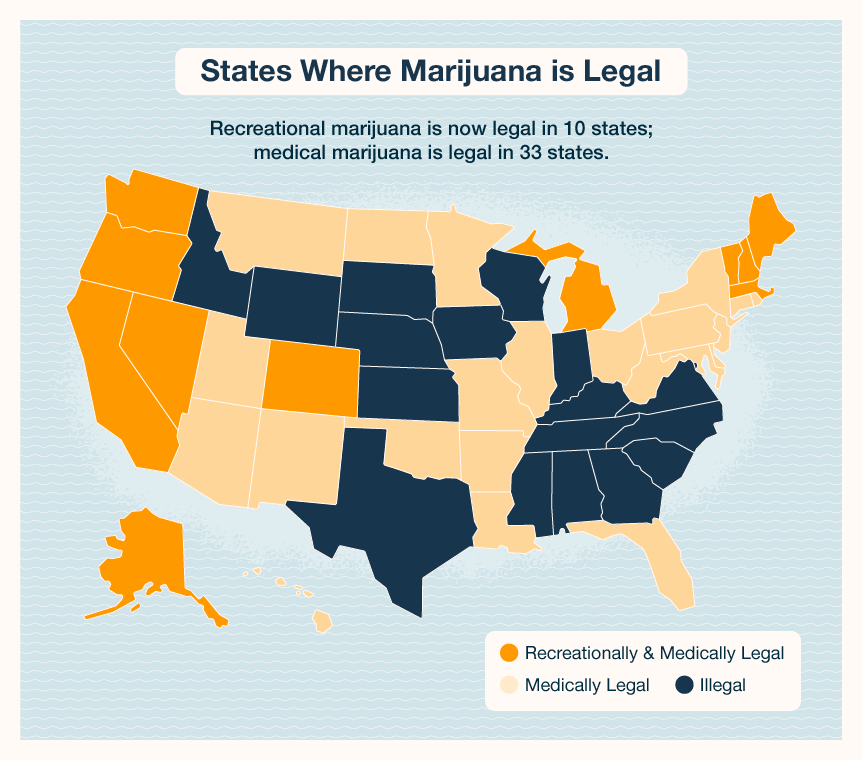
Medical marijuana is approved in many states as a supplemental treatment for cancer patients, but it’s always important to stay up-to-date on your state’s current cannabis legislation.
Be forthright. There is nothing wrong or illegal about discussing medical cannabis with your doctor, even if you live in a state where marijuana is not legal. The Supreme Court ruled that doctors may not be investigated, threatened or punished by federal regulators for recommending marijuana as a medical treatment for their patients.
As a result, doctors are free to discuss medical marijuana as a treatment option with their patients. Many doctors are accustomed to patients bringing alternative ideas to them about treatment and preferences, so remember that medical cannabis should be no different. Use these tips below to make the conversation as smooth as possible.

Talking to your doctor about medical marijuana isn’t always easy, but the public perception of cannabis is changing, which means that many doctors are becoming more open to discussing marijuana. Having this list handy can help make things easier when you discuss your options with your doctor.
Before deciding on marijuana as a form of treatment, there are several important factors to consider:
Because cannabis therapy is relatively new in the mainstream, a current challenge for many patients is the lack of regulation. Unfortunately, not all cannabis is created equal, which means it’s important that you do your due diligence to find quality products.
Some legal states like California have a general framework for the regulation of commercial medicinal and adult-use cannabis, meaning that products you find in a dispensary meet state standards. However, there are several things you should consider when using marijuana as part of your cancer treatment program.
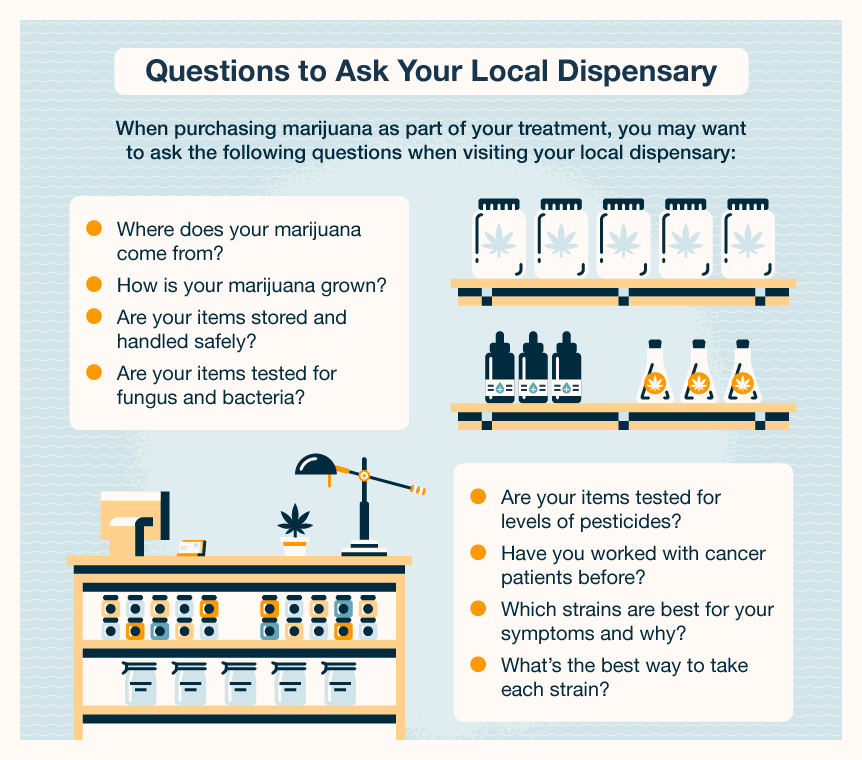
Ensuring that you receive a quality product is of the utmost importance, so don’t be afraid to take your time inquiring about specific cannabis products with your local dispensary. There is a difference between recreational (adult-use) and medical dispensaries, so you may feel more comfortable visiting a dispensary specifically geared towards medical cannabis.
Medical cannabis dispensaries are designed to give patients a secure location to procure information and cannabis grown to treat ailments. They’re usually regulated and taxed differently than recreational cannabis dispensaries. For this reason, prices of cannabis may vary.
More research is needed to learn about the potential effects and limitations of cannabis-derived medicines for both adult and pediatric cancers. This lack of evidence is precisely the problem — and it’s exacerbated by the current federal regulations around medical marijuana. Clinical findings are limited because marijuana is still classified as an illegal substance by the federal government.
Many people are advocating for the government to loosen restrictions on cannabis so more research can be done. On the horizon for medical marijuana is the Medical Marijuana Protections Through the Compassionate Access, Research Expansion and Respect States (CARERS) Act. This bill would end the conflict between state and federal medical cannabis laws.
Under the CARERS Act, all state-legal medical cannabis conduct would be exempt from the Controlled Substances Act (CSA), delisting cannabidiol as a schedule 1 drug. It would also lift research burdens, allow banking services to medical cannabis businesses, and enable V.A. doctors to write medical cannabis recommendations for veterans living in states with medical cannabis programs.
Navigating cancer treatment is difficult enough and shouldn’t be complicated by limited access to medical marijuana. We hope this guide helps shed some light on the wide array of resources for you to incorporate cannabis in your treatment routine. Before you decide to try medical marijuana as a supplement to your cancer treatment, do adequate research, seek additional opinions and talk with your oncologist to make sure it’s the right choice for you.
Learn more about how cannabis can help you with cancer treatment and symptom management by finding a medical marijuana doctor and dispensaries in your area.
Sources:
Americans for Safe Access | Marijuana and Cancer | Cancer Network | Harvard University | International Cannabinoid Research Society | International Association for Cannabinoid Medicines | Society of Cannabis Clinicians | American Cannabis Nurses Association | Canadian Consortium for the Investigation of Cannabinoids | University of California Center for Medicinal Cannabis Research | Marijuana as Medicine? The Science Behind the Controversy | Marijuana and Medicine: Assessing the Science Base | Using Medical Cannabis in an Oncology Practice
No Information on MarijuanaDoctors.Com should be used to diagnose, treat, prevent or cure any disease or condition. You can view our Full Disclaimer here.